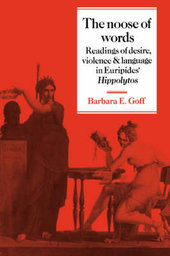
|
The Noose of Words: Readings of Desire, Violence and Language in Euripides' Hippolytos
Paperback / softback
Main Details
| Title |
The Noose of Words: Readings of Desire, Violence and Language in Euripides' Hippolytos
|
| Authors and Contributors |
By (author) Barbara Goff
|
| Physical Properties |
| Format:Paperback / softback | | Pages:156 | | Dimensions(mm): Height 228,Width 151 |
|
| Category/Genre | Literary studies - classical, early and medieval |
|---|
| ISBN/Barcode |
9780521033237
|
| Classifications | Dewey:882.01 |
|---|
| Audience | | Professional & Vocational | |
|---|
| Illustrations |
Worked examples or Exercises
|
|
Publishing Details |
| Publisher |
Cambridge University Press
|
| Imprint |
Cambridge University Press
|
| Publication Date |
25 January 2007 |
| Publication Country |
United Kingdom
|
Description
This 1990 book is a reading of Euripides' Hippolytos, a central play for the study of Euripides and of Greek tragedy. Dr Goff approaches the play through the techniques of modern literary criticism, including deconstruction and feminism, and is able to shed light on this influential text through her close examination of the language of the play. She divides her discussion into five important critical issues: gender, desire, violence, language and the status of poetry and drama. Throughout she is concerned to site the play in the historical and cultural context of fifth-century Athens, and her analysis of the position of women is particularly illuminating for the role of Phaedra, and for female characters throughout Greek tragedy. This is a provocative book which brings critical insights to one of the most extensively discussed of all Greek tragedies. It will be accessible both to classicists and students of drama and literary theory.
Reviews"Barbara Goff offers here a new reading of Euripedes' Hippolytos, one that builds on and significantly extends earlier work on this very important play. She skillfully combines the workings of contemporary literary theory (her most obvious debts are to Rene Girard and Jacques Derrida) with close philological analysis. The theory she deploys enables Goff to offer very convincing readings of vexed aspects of the play." Nancy Sorkin Rabinowitz, American Journal of Philology
|